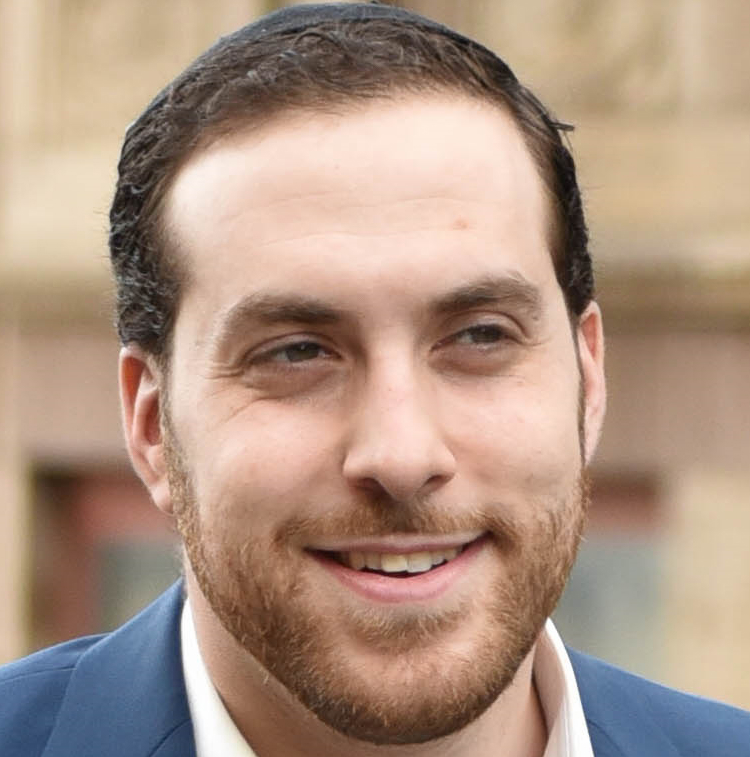Yair Rosenberg is a senior writer at Tablet, a digital Jewish current affairs magazine, where he writes about religion, politics and culture. He joined the staff after earning his degree in Jewish studies from Harvard, where he wrote his thesis on the little-known close friendship between Albert Einstein and Rabbi Chaim Tchernowitz. On Nov. 10, he’ll be giving a talk on that subject as part of Limmud in Toronto, a week after his participation in JSpaceCanada’s fourth biennial conference.
Let’s start at the beginning. When did you decide you wanted to be a journalist?
I didn’t actually set out to be a journalist. I did Jewish studies and history in university. I thought maybe I’d write some things on the side when I had something to say, but it turns out, people are willing to pay you to say things you wanted to say anyway. People kept offering me opportunities, and eventually I got the job that I have now.
What made you want to focus on Jewish studies while you were at Harvard?
I have a very strong Jewish background. My parents are both Jewish educators – my dad is a synagogue rabbi and the renowned author of The (Unofficial) Hogwarts Haggadah, for those who are familiar with it. My grandparents were Holocaust survivors. I was fortunate to receive some very expansive Jewish education, and so, when I went to university, I naturally wanted to scale that up.
But I wanted to write for more people than the academy reaches, and I wanted to write in a way that was clearer for people. I think people actually would appreciate the complicated insights scholars have towards Judaism, Israel and religion. But very often, it’s written in a way that’s not accessible to them.
That segues into my next question, which is about the talk you’re giving at Limmud. It’s basically the thesis you wrote. Can you summarize it briefly?
I will answer that, but I should add that I’m doing two things at Limmud. I’m also doing a panel with Haroon Moghul, a friend of mine, about Jewish-Muslim relations.
My solo talk is about Albert Einstein’s 20-year friendship with a rabbi named Chaim Tchernowitz. He befriended Albert Einstein: they became close, they would go on vacations together, they went sailing together. Nobody really knows this story – it’s, like, one footnote in one Einstein biography of the many that exist.
How did you find the story?
I was actually trying to write my thesis about Rabbi David Zvi Hoffman, this titanic figure of German Jewry. I thought, I’ll break off a tiny piece – one book he wrote, one thing he said – and I’ll write about that. So I spent a semester trying to find that way in, and I couldn’t do it. But along the way, I picked up this book written by Chaim Tchernowitz who wrote this book of memoirs, and in every chapter is a different famous Jew he taught, studied with or otherwise knew. It had a chapter on David Zvi Hoffman, but the very last chapter is called “My Meeting With Einstein.” I was curious – did this go anywhere? I did some research to see if there was a later relationship beyond this initial meeting. And if you come to my talk, you’ll find out what I found.
How do you find the differences between researching contemporary issues, like politics, versus when you dig into historical archives?
I actually think you can’t do one without the other. In practice, a lot of journalism does one of these things without the other. The news is moving so fast, we just write up whatever we see and move on to the next thing. But you can’t really understand what’s going on now if you don’t understand what came before. To the extent that my journalism adds something, I feel like a lot of it comes back to the fact that I’ve been informed by significant knowledge about whatever it is I’m writing about. So if I write about contemporary Israeli politics, it has to be informed by the last 70-plus years of Israeli politics – and beyond, in fact.
But you also have the privilege of writing for a magazine where you have more leeway to go into history and less of a breaking news mandate.
Exactly. We do not exist to break news, we exist to write longer reflections on what’s going on. That means I have the runway to do research and backstory that I want to do, to add context and understanding for our readers. The fact that we have a very substantial readership shows that people are looking for this.
Okay, so now we’re talking about politics. I have to ask, what’s more fun for you to cover right now: the out-of-control Israeli election or the out-of-control American one?
To be honest, it was more fun to cover both of them five years ago. Because, yes, things are crazy, they’re frenetic, there’s lots of action – but I don’t get joy out of the fact that things are frenetic or there’s lots of action if the underlying reasons for that are depressing. The underlying reasons why politics is so chaotic right now in Israel and in America, and other places in the world, is that there are some really dark forces that are tearing apart these countries and some very bad actors who are marshalling those forces. I don’t get any pleasure out of that.
OK, “fun” was the wrong word.
Well, no, I think you’re absolutely right – a lot of journalists find the chase to be inherently invigorating. I do, but only to a point. And we’ve passed that point.
At least the media didn’t find any images of Trump or Netanyahu wearing blackface this month.
I mean, there are how many weeks before this gets printed? Never say never.
This interview has been edited and condensed for style and clarity.
